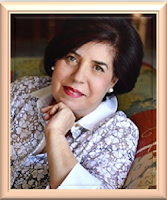WOMEN AND POETRY
For all the violence
imposed on her
For all the
humiliation she has suffered
For her body that you
have taken advantage of
For her intelligence
that you have stepped
For the ignorance
which you have left her in
For the freedom you have
denied her
For the mouth you
shut, and for the wings you clipped
…………………….
W. Shakespeare from
Stand Gentlemen in front of a Woman.
Women have been for
long the object, not the subject of poetic narration. The numerical disparity
between the works of male and female matrix depends on a series of variables
that sees, in every society, them considered as beings to be relegated to
domestic environments, their education and entry in social contexts denied.
They had to fight with sagacity and determination to conquer, and in small
steps, each freedom that was them precluded. Nonetheless women poets have been
able to give their own personal reading of the world, giving voice to
fundamental themes in the life of individuals up to the definition of a self
that is not individualistic but collective, the female self.
The first known
poetess, that the history of poetry remember, is Enheduanna, a Sumerian
priestess who lived approximately in the XXIV BC. After her, one of the most
beloved name in women's literature is that of Sappho, a Greek poetess who lived,
more or less, in the 6th century BC.
Originally from the island of Sappho, she took care of the education of
young girls from aristocratic origins. Her only composition preserved intact is
the Hymn to Aphrodite, goddess of love.
Many centuries go by
before poetic compositions signed by female authors appear again. In the 13th
century, under the pseudonym of Compiuta Donzella, an Italian from Florence
breaks the silence with three sonnets. And it is in the second half of the
1300s that Christine de Pizan, author of both philosophical and poetic texts,
marks a historical moment in women's literature as the first author who lives
by writing. But it is after the Renaissance that in Europe women become real protagonists of verse
writing. And if in all this long period of time they had been considered
marginal figures in the literary field at the end of the nineteenth century,
they are recognized equal dignity in relation to their male colleagues. This is
the time when the names of Emily Dickinson, Madame de Stael, Eveline Cattermole
emerge.
At the international
level it is during the twentieth century that the richest production of female
poetry is recorded and that counts some figures still of great inspiration
today. Among them, worthy of mention are Sylvia Plath credited with advancing
the genre of confessional poetry;, Anne Sexton who was the first to tackle
problems such as abortion, sexuality and women's rights becoming one of the
first feminist authors like Virginia Woolf; Ada Negri nominated to the Nobel
Prize in 1927, Grazia Deledda who summarizes in her poetics all the main
currents of the time and the first and still the only Italian woman to receive
the Nobel Prize for the literary section in 1926.
The women poets
distinguished themselves for the investigative perspective and the spirit of
observation with which they described the world around them, complex and
difficult both from a literary and a social point of view and which saw the
woman at the beginning of her political and cultural emancipation. Their gaze
towards this world is not central, but observes from the margins of the society
in which they are locked up as wives and mothers, rather than as poetesses.
Their analysis is very far from the masculine one which includes the narration of
the war. Their verses delicately describe the point of view of the most humble,
marginalized part of society or the hypocrisy of the more educated social
classes.
The international scene today boasts a long list of names of poetesses who describe, with different styles and sensibilities, every aspect of female everyday life. Capable of probing the human soul, they produce compositions of great emotional impact, which tell reality with a new gaze and the condition of women with a surprising sincerity, moving the consciences of readers with passionate and intense reflections.
Maria Miraglia



Wonderful article Maria Miraglia. I wish to state that Sappho lived on the Isle of Lesbos in the Aegean Sea 350 B.C. Thus we get the name for women who love each other romantically - Lesbians. Here is my favorite poem by Sappho: Yes, gold is the son of Zeus, no rust
ReplyDeleteits timeless light can stain.
The worm that turns man's flesh to dust,
Assaults its strength in vain.
More gold, than gold, this love I sing
A hard inviolable thing.
Sappho - 350 B. C.
With love and great respect,
Annie Johnson